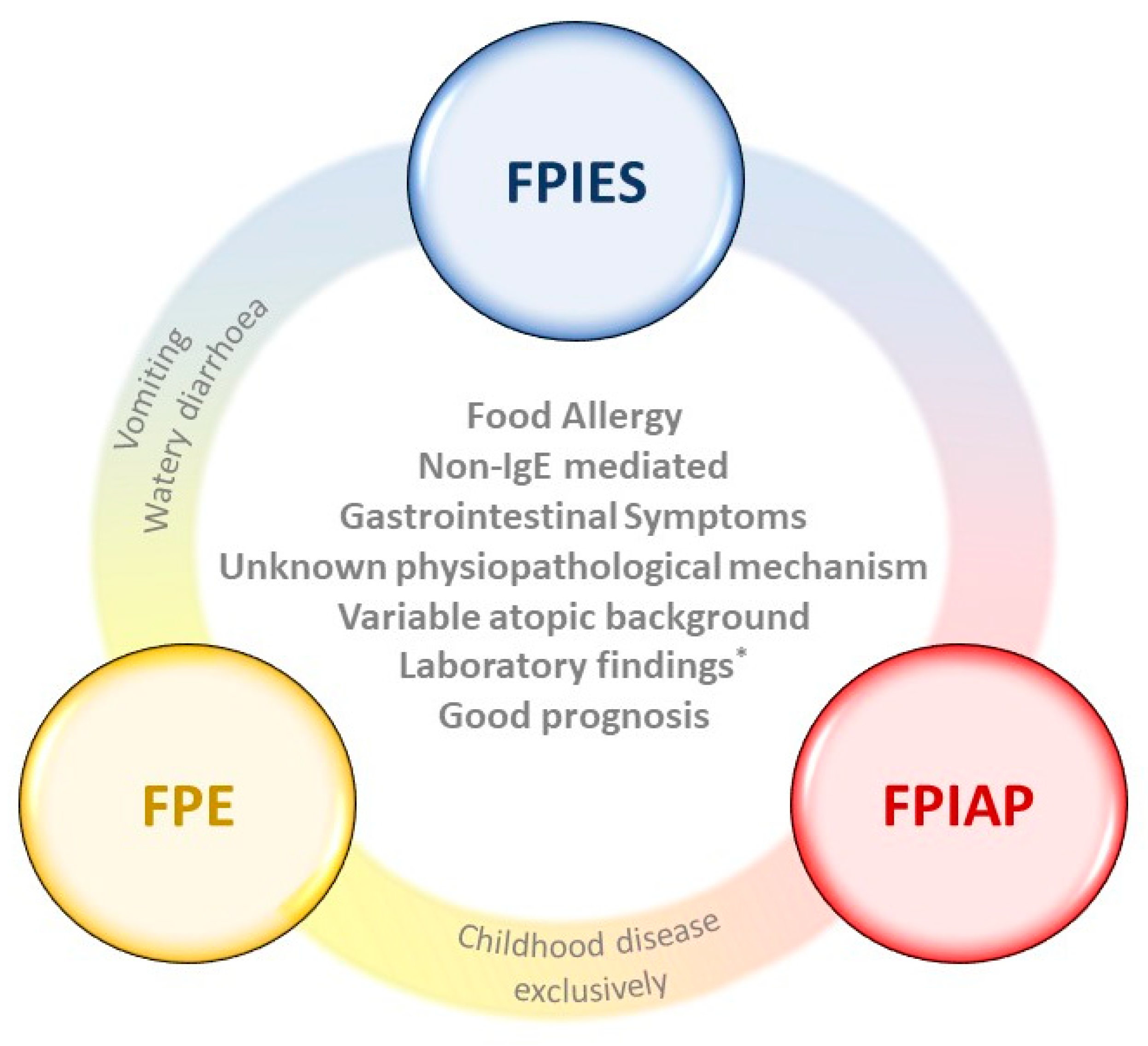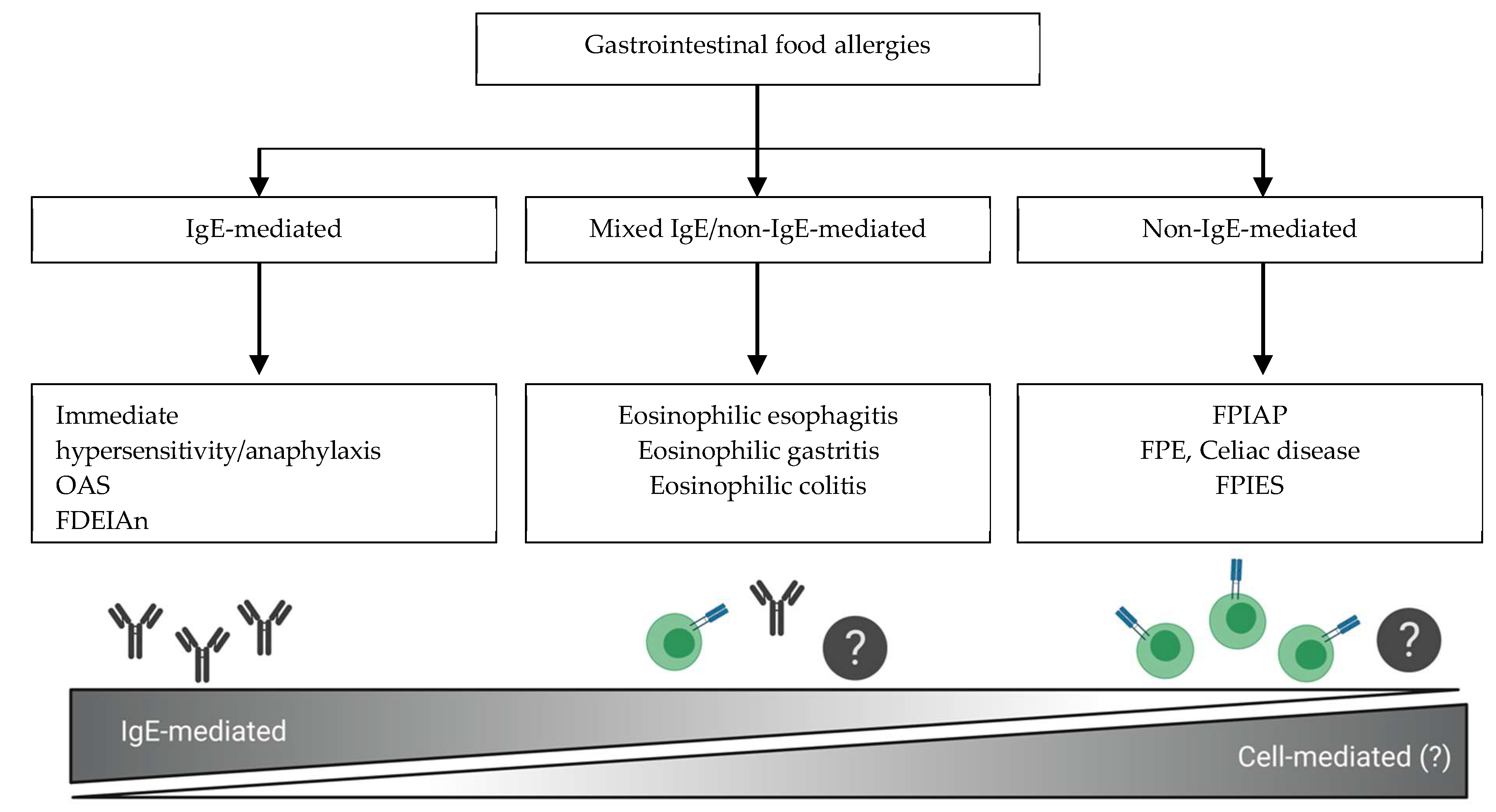food protein-induced enterocolitis syndrome a review of the new guidelines
High-quality studies providing insight into the pathophysiology diagnosis and management are lacking. We review here the peculiar characteristics of this syndrome.

A Slice Of Food Protein Induced Enterocolitis Syndrome Fpies Insights From 441 Children With Fpies As Provided By Caregivers In The International Fpies Association The Journal Of Allergy And Clinical Immunology In
9 rows The first International Consensus Guidelines for the Diagnosis and Management of Food.

. The workgroup outlined clinical phenotypes proposed diagnostic criteria and made recommendations on management. 5 rows Food protein-induced enterocolitis syndrome FPIES is a non-IgE mediated food allergy. Narrative review MJA 210 2 4 February 2019 Food protein-induced enterocolitis syndrome.
The first International Consensus Guidelines for the Diagnosis and Management of Food Proteininduced Enterocolitis Syndrome were published in 2017 and reviewed epidemiology clinical presentation and prognosis of acute and chronic FPIES. The workgroup outlined clinical phenotypes proposed diagnostic criteria and made recommendations on management. Symptoms may include intractable vomiting diarrhea lethargy pallor abdominal distention hypotension andor shock.
The first International Consensus Guidelines for the Diagnosis and Management of Food Protein-induced Enterocolitis Syndrome were published in 2017 and reviewed epidemiology clinical presentation and prognosis of acute and chronic FPIES. We will update these links period This site uses cookies. Despite the potential seriousness of reactions awareness of FPIES is low.
Reactions are characterized by the delayed onset of gastrointestinal symptoms predominantly repetitive vomiting which is often severe and should be considered a medical emergency. The recent publication of the First International Consensus Guidelines allowed a positive interaction between different research groups with. Guidelines summary and practice recommendations Sam Mehr12 Dianne E Campbell23 F ood protein-induced enterocolitis syndrome FPIES is a poorly understood food allergy that most commonly af-fects infants under the age of 2 years1 It is so named due.
Food protein-induced enterocolitis syndrome FPIES is a poorly understood non-IgE gastrointestinal-mediated food allergy that predominantly affects infants and young children. And clinical outcomes are poorly established. In the last years the interest of the scientific community toward food protein-induced enterocolitis syndrome FPIES has grown exponentially.
Acute FPIES typically presents between one and 4 hours after ingestion of the trigger food with the principal. Food proteininduced enterocolitis FPIES is a non-IgE cell-mediated food allergy that can be severe and lead to shock. Oral food challenges OFCs given at food protein dose.
Cells of the innate immune system appear to be activated during an FPIES reaction. The first International Consensus Guidelines for the Diagnosis and Management of Food Protein-induced Enterocolitis Syndrome were published in 2017 and reviewed epidemiology clinical presentation and prognosis of acute and chronic FPIES. Acute food protein-induced enterocolitis syndrome FPIES is a non-IgE-mediated allergy and is characterized by repetitive profuse vomiting episodes often in association with pallor lethargy and diarrhea presenting within 1-4 h from the ingestion of a triggering food.
The most common food triggers include soy cows milk and grains. 3 Diagnosis of FPIES is difficult. Food protein-induced enterocolitis syndrome FPIES is a severe presentation of non-IgE-mediated food allergy affecting the gastrointestinal GI tract mainly in infants and young children.
By continuing to browse this site you are agreeing to our use of cookies. 1 2 This syndrome is typically characterized by profuse vomiting and lethargy occurring classically 14 hours after ingestion of the offending food. While the pathophysiology of FPIES is poorly understood the clinical presentation of acute FPEIS reactions has been well characterized.
Food Protein-Induced Enterocolitis Syndrome FPIES is a non-IgE mediated food allergy most commonly presenting in infants. The workgroup outlined clinical phenotypes proposed diagnostic criteria and made recommendations on. Up to 10 cash back Food protein-induced enterocolitis syndrome FPIES is an increasingly recognized non-immunoglobulin E IgE-mediated reaction to food.
Research in the last decade has steadily advanced our knowledge of the condition. Food protein-induced enterocolitis syndrome FPIES. Food protein-induced enterocolitis syndrome FPIES is a severe presentation of non-IgE-mediated food allergy affecting the gastrointestinal GI tract mainly in infants and young children.
3 Diagnosis of FPIES is difficult. We review the recent literature in relation to. We review here the peculiar characteristics of this syndrome.
To characterize the demographics food triggers risk factors and management in children with food protein-induced enterocolitis syndrome FPIESIn the study researchers included information about 441 children from 403 families with caregiver-reported FPIES among members of the lay organization the International Food Protein-Induced Enterocolitis. This topic includes links to society and government-sponsored guidelines from selected countries and regions around the world. Acute FPIES is characterized by vomiting 14h andor diarrhea within 24h after ingestion of a culprit food.
In the last years the interest of the scientific community toward food protein-induced enterocolitis syndrome FPIES has grown exponentially. Cells of the innate immune system appear to be activated during an FPIES reaction. 12 This syndrome is typically characterized by profuse vomiting and lethargy occurring classically 14 hours after ingestion of the offending food.
Up to 10 cash back Food protein-induced enterocolitis syndrome FPIES is a non-IgE-mediated food allergy that has been well-characterized clinically yet it is still poorly understood. Acute FPIES typically presents between one and 4 hours after ingestion of the trigger food with the principal. Up to 10 cash back Purpose of Review Many aspects of food protein-induced enterocolitis syndrome FPIES remain poorly studied such as its pathophysiology dietary management biomarkers for diagnosis and onset of tolerance.
The first International Consensus Guidelines for the Diagnosis and Management of Food Protein-induced Enterocolitis Syndrome were published in 2017 and reviewed epidemiology clinical presentation and prognosis of acute and chronic. The recent publication of the First International Consensus Guidelines allowed a positive interaction between different. Food proteininduced enterocolitis syndrome FPIES is a poorly understood nonIgE gastrointestinalmediated food allergy that predominantly affects infants and young children.
Food proteininduced enterocolitis syndrome FPIES is a nonIgE-mediated food hypersensitivity featured by gastrointestinal symptoms such as profuse vomiting and sometimes also accompanied by diarrhea and a systemic inflammatory response1 The timing of food introduction affected the age at onset of FPIES. Food protein-induced enterocolitis syndrome FPIES is a non-IgE mediated food allergy presenting in infants younger than 12 months.

Foods Free Full Text Non Ige Mediated Gastrointestinal Food Protein Induced Allergic Disorders Clinical Perspectives And Analytical Approaches Html
Food Protein Induced Enterocolitis Syndrome As A Cause For Infant Hypotension The Western Journal Of Emergency Medicine

Clinical Types Of Food Protein Induced Enterocolitis Syndrome Fpies Download Scientific Diagram

Food Protein Induced Enterocolitis Syndrome The Journal Of Allergy And Clinical Immunology In Practice

Advances In Understanding Immune Mechanisms Of Food Protein Induced Enterocolitis Syndrome Annals Of Allergy Asthma Immunology

Food Protein Induced Enterocolitis Syndrome Annals Of Allergy Asthma Immunology

References In Immunopathophysiology Of Food Protein Induced Enterocolitis Syndrome Journal Of Allergy And Clinical Immunology

Clinical Types Of Food Protein Induced Enterocolitis Syndrome Fpies Download Scientific Diagram

Nutrients Free Full Text Non Ige Mediated Gastrointestinal Food Allergies In Children An Update Html

References In Food Protein Induced Enterocolitis Syndrome Not So Rare After All Journal Of Allergy And Clinical Immunology

Pdf International Consensus Guidelines For The Diagnosis And Management Of Food Protein Induced Enterocolitis Syndrome Executive Summary Workgroup Report Of The Adverse Reactions To Foods Committee American Academy Of Allergy Asthma Immunology

Clinical Manifestations Of Food Protein Induced Enterocolitis Syndrome Download Scientific Diagram

Food Protein Induced Enterocolitis Syndrome Oral Food Challenge Annals Of Allergy Asthma Immunology

Oral Food Challenge In Food Protein Induced Enterocolitis Syndrome Download Table

Interpretation Of The Food Protein Induced Enterocolitis Syndrome Oral Download Table

Food Protein Induced Enterocolitis Syndrome Fpies Pediatric Focus

Management Of Acute Food Protein Induced Enterocolitis Syndrome Emergencies At Home And In A Medical Facility Annals Of Allergy Asthma Immunology